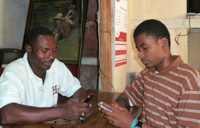Anthropology and sociology Professor Espelencia Baptiste of Kalamazoo College will discuss how mobile banking could have helped promote development in post-earthquake Haiti, but failed to be widely adopted.

Baptiste will deliver the Diana Massiah Lecture in Caribbean Studies on Wednesday, Nov. 12, at 2:30pm at 135 Vanier College, Keele campus. This is the second lecture in a three-year series established at the Centre for Research on Latin America and the Caribbean (CERLAC) in 2013 to celebrate the 65th birthday of Diana Massiah. Originally from Barbados, Massiah settled in Toronto in the mid-1980s. She maintains close ties with the Barbadian community and has been a director of the Barbados Ball, an organization focused on raising funds for postsecondary scholarships and health care. She is also involved with the Toronto chapter of the Harrison-Queens College Alumni Association.
Baptiste’s talk, Banking the Unbanked: Mobile Banking as Recovery in Post-Earthquake Haiti, is co-sponsored by Vanier College, the Department of Humanities, the Department of Anthropology and CERLAC. Everyone is welcome to attend.
The 7.0 magnitude earthquake that devastated Haiti’s already poor infrastructure on January 12, 2010, exacerbated the daily challenges many Haitians face, says Baptiste. At the best of times, banking in Haiti has been difficult, and the damage the earthquake wrought to telephone landlines made it more difficult for both ordinary Haitians and international agencies trying to access their accounts and move their money around.

Mobile phone use, meanwhile, increased dramatically. Capitalizing on this shift, international agencies introduced mobile phone banking, not only for purposes of short-term recovery but also in the hope that it would increase “financial inclusion” and thus promote development in the long term. Four years later, however, adoption of the technology remains timid. Baptiste’s talk will explore this failure as a window onto the vicissitudes of post-earthquake reconstruction in Haiti.
Born and raised in Haiti, Baptiste specializes in the anthropology of education, ethnicity and nationalism, diasporas, Creole societies, and language and culture, as well as mobile banking, voodoo and inheritance in Haiti. She has worked in Saint Lucia, Mauritius, Kenya and Haiti, and her book How Citizens are Produced and Ethnicity Maintained in Post Colonial Mauritius with Special Attention to the Creoles: An Anthropological Study (Mellen Press) was published in 2012.
Following the lecture, the PhD student winner of the Grace and David Taylor Award in Caribbean Studies will be presented with the award worth $5,000. The award is presented annually to a York graduate student working in any area of study of the Caribbean region to support research.
This year’s winner is Denese Gascho, a PhD student in the communication and culture program, for her project “Media Policy and Self-Representation: The Case of Jamaican Subscription Television.” Gascho’s work examines the political economy of the subscription television industry in Jamaica as it enables a greater diversity of cultural expression than broadcast television but also marginalizes the rural poor.
CERLAC is currently receiving donations for its Endowment for Research. To donate, visit the CERLAC giving page.
For more information, visit the CERLAC website.


